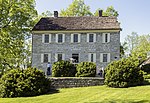Continental Clay Brick Plant
Berkeley County, West Virginia Registered Historic Place stubsBrickworks in the United StatesBuildings and structures in Martinsburg, West VirginiaIndustrial buildings and structures on the National Register of Historic Places in West VirginiaKilns ... and 1 more
National Register of Historic Places in Martinsburg, West Virginia

The Continental Clay Brick Plant in Martinsburg, West Virginia includes a number of beehive brick kilns. Originally a coal-fired brickworks, it was later converted to natural gas. The kilns are now largely disused, except for a few used to dry sand.
Excerpt from the Wikipedia article Continental Clay Brick Plant (License: CC BY-SA 3.0, Authors, Images).Continental Clay Brick Plant
Charles Town Road, Martinsburg
Geographical coordinates (GPS) Address Nearby Places Show on map
Geographical coordinates (GPS)
| Latitude | Longitude |
|---|---|
| N 39.433055555556 ° | E -77.958611111111 ° |
Address
Charles Town Road 154
25401 Martinsburg
West Virginia, United States
Open on Google Maps











